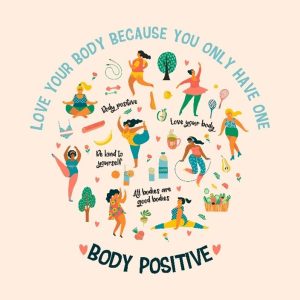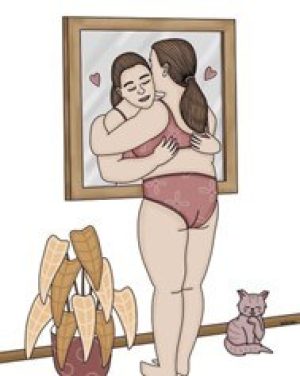Fostering a Positive Body Image

(Image source: https://europeanwriterstour.com/images-2023/positive-body-image)
Body image can be defined as a person’s attitude towards, and their perception of, their body. Attitudes may include positive and negative beliefs, which are strongly influenced by our experiences (e.g. family, friends, media, places, things around us).
Fostering a positive body image is a crucial aspect of our children’s overall wellbeing. In this age of social media where our children see ‘perfect’ bodies everywhere, how can we help them learn to stop comparing themselves and love the skin they are in?
According to the Centre for Clinical Interventions (www.cci.health.wa.gov.au) it is unrealistic to aim to be completely satisfied with our bodies, but we can learn to be more accepting. This is likely to take some time, but there are things you can do right now to start improving your child’s body image.
Here are some practical tips to help you navigate this important aspect of your child’s development:
Promote Healthy Habits, not Appearance:
Encourage healthy habits such as regular physical activity and balanced nutrition. Emphasize the importance of feeling good and energized rather than focusing on appearance.
Identify Activities that Help Them Feel Good in Their Body:
Go to the beach, play a musical instrument, practise yoga or relaxation, have a bath, walk the dog, visit a friend, participate in a team sport, etc.
Expand Their Areas of Interest:
When undue importance is placed on one aspect of life (e.g. appearance), other interests may be neglected. Support your child to think of a new activity to try, or an old interest to return to.
Lead by Example:
Children learn by observation. Model a positive attitude towards your own body, avoid negative self-talk, and demonstrate self-care practices. Your behaviour sets a powerful example for them to follow.
Encourage Open Communication:
Create an environment where your child feels comfortable discussing their feelings and concerns about their bodies. Encourage open and honest conversations without judgment.
Consider Factors that have Influenced Their Body Image:
How did their attitudes and perceptions develop? Have they changed over time? What would help them to start creating a positive image now?
Consider What They do Like about Their Bodies:
Let them scan their body for things they like rather than dislike. If this is difficult, start with a body part that they dislike the least, then practice paying attention to it.
Help Them to Accept Their Genetics:
All bodies are genetically wired to be a particular size and shape, and your body will fight to maintain this. Forcing your body to change is likely to come at a tremendous cost.
Consider Body Function:
Consider each body part for its purpose or function. Legs allow us to walk, run and dance. A womb may bear a child one day. A scar tells a story about your life. What parts of their body are they grateful for?
Consider the Features that Make Other People Attractive:
Is it always purely their appearance? Or is it also their personality, attitude and actions?
Identify ‘Feeling Fat’:
People with poor body image often say, “I feel fat.” This is one way of expressing feelings that are hard to label, interpret, or acknowledge. Try to identify and explore emotions that might be triggers for ‘feeling fat’.
Evaluate Body Image Attitudes Like a Scientist or Lawyer:
Do they have factual evidence to support their beliefs? Do others agree with their attitude?
Diversify Media Exposure:
Be mindful of the media your child consumes. Introduce a variety of body types, shapes and sizes through books, movies and online content to help them understand and appreciate diversity.
Teach Media Literacy:
Educate your child about media literacy, helping them understand that images in the media are often edited or manipulated. Teach them to critically analyze media messages and recognize unrealistic beauty standards.
Here are two links to time-lapsed videos that show what is often going on behind the scenes of some of these ‘perfect bodies’ we see on the internet with the help of a hair and make-up artist and of course, Photoshop.
https://www.youtube.com/watch?v=17j5QzF3kqE
https://www.youtube.com/watch?v=iYhCn0jf46U
Avoid Diet Talk:
Be cautious about discussing diets, weight loss, or negative body comments. (Refrain from praise and complimenting your child when they have lost weight!) Focus on promoting a positive relationship with food and encourage intuitive eating habits.
Compliment Effort and Personality:
Compliment your child’s efforts, accomplishments and positive personality traits rather than commenting on their physical appearance. Reinforce the idea that their value extends far beyond how they look and that their worth is not determined by their looks but by their unique qualities, efforts, life choices and accomplishments.
Keep at it:
Remind yourself that improving body image takes time and practise.
Remember, fostering a positive body image is an ongoing process that requires patience and consistent effort. By instilling these values, you contribute to the development of resilient, confident and self-loving individuals.
I would like to leave you with this insightful poem by Donna Ashworth:

OR YOU COULD JUST LIVE
You are going to wish your body was more,
You are going to wish your body was less,
You are going to wish your body would change,
You are going to wish your body would not.
You are going to wish your body was many things,
between now,
and the day you leave this mortal coil.
And one day,
as is always the way,
you will look back,
and see,
that your body was always as it should be.
Doing its best
To be you,
for you.
And you are then going to wish that just once,
you had told your body,
‘I accept you, as you are, right now’.
And that maybe had you done this,
you would have spared yourself a lifetime,
of wishing for something you didn’t really ever need.
That what it was you should have been wishing for, in fact,
was the courage to accept,
the strength to embrace,
the wisdom to really see,
what you have.
You’re going to wish for many things,
when it comes to your body.
Or you could just wish for health.
And live your life,
flawed
and
beautiful.
Donna Ashworth
From ‘I wish I knew’
https://www.waterstones.com/win/i-wish-i-knew-prize-draw
Art by Helma Speksnijder #helmaspeksnijder @helmaspeksnijder
Until next time,
Marisa Smit
School Psychologist

 903
903










